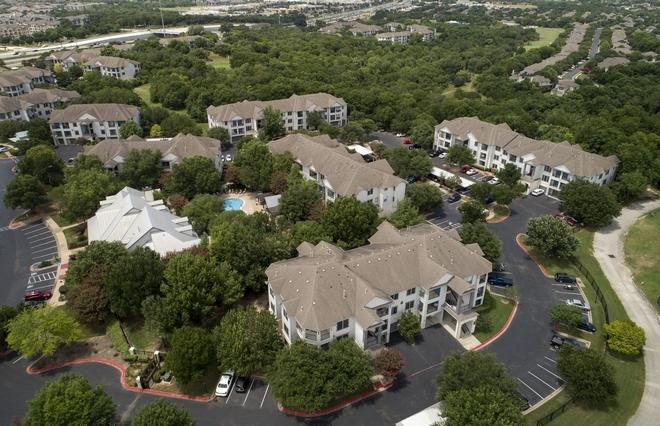News entry content
A new $70 million investment to turn a 452-unit Southeast Austin apartment complex into affordable housing is the latest effort by Austin’s housing authority to expand its real estate footprint, those associated with the deal say.
The Community Development Trust, a national group that provides capital for affordable housing projects, announced that it is helping the Austin Housing Authority buy the Asher Apartments complex, southeast of Interstate 35 and Slaughter Lane.
The housing authority’s nonprofit branch, the Austin Affordable Housing Corp., will operate the complex as The Bridge at Asher Apartments. It will restrict rentals to people making 80% of the Austin area median family income or less. Median family income in the metro area last year was $60,200 for an individual and $86,000 for a family of four.
Additionally, the complex will give first priority to people using housing vouchers, which are given to tenants making 30% of the average median family income or less, said Michael Gerber, CEO of the housing authority, which has a city-appointed board but is not part of the city.
“A big part of this purchase was fulfillment of the broader goal that the city shares of all types of housing for all types of people in all parts of town,” Gerber said. The authority “has really been working in the last several years to acquire and build new units. We’ve acquired or built about 4,500 units.”

That’s unusual for a housing authority, said Michael Lear, head of acquisitions for The Community Development Trust, which has worked on affordable housing projects in 44 states and territories.
“It’s rare that housing authorities are expanding the footprint of land that they own,” Lear said. “From a housing policy perspective, it’s fairly radical.”
Austin is the most expensive real estate market in Texas, according to the trust. Last year, median rent hit an all-time high of $1,278 per month. That’s largely due to job growth drawing thousands of newcomers to the region. In May, the median home in Austin sold for $407,400, an all-time record for any month.
Much ink has been spilled and innumerable solutions debated over how to keep Austinites in Austin, as many are priced out to the suburbs.
The Bridge at Asher Apartments will be the fifth Austin project shared between the trust and the authority. The others are all in North Austin: The Bridge at Tech Ridge, and The Bridge at Center Ridge, north of Parmer Lane; Preserve at Wells Branch, off Wells Branch Parkway; and Bridge at Northwest Hills, south of Spicewood Springs Road. The trust and the housing authority now jointly own 1,716 units in Austin, with about half of them income-restricted, officials said.
The number of units the housing authority owns is now six times the 750 it was when Gerber started as CEO seven years ago. “I don’t want to say we’ve been slow to get into the game,” he said, “but it’s taken us some time to figure out what’s the right way to get into real estate acquisitions.”
Gerber and Lear called the Asher project a good location in a growing area of South Austin, with good schools and nearby jobs. The trust provided equity for the project with the help of a loan from the National Housing Trust and a $4 million grant from the Kresge Foundation, through a program to increase affordable housing in areas with above-average public schools.
The Asher property curves along wooded hiking trails and was recently remodeled. It has many two- and three-bedroom units, which can cater to families and are often difficult to find in apartment complexes, Lear said. It’s in an area where rents are generally affordable now but are expected to rise, in keeping with the trust’s effort to stay ahead of the curve and guard against rent increases, he said.
Over the next decade, Austin needs at least 60,000 units affordable to households making under $60,000 annually, according to the city’s Strategic Housing Blueprint. Voters last year approved $250 million in bond money for affordable housing.
Gerber noted that numerous governmental and non-governmental entities in Austin are collaborating on affordable housing goals.
“We’re a drop in the bucket, but it’s a significant drop,” he said.